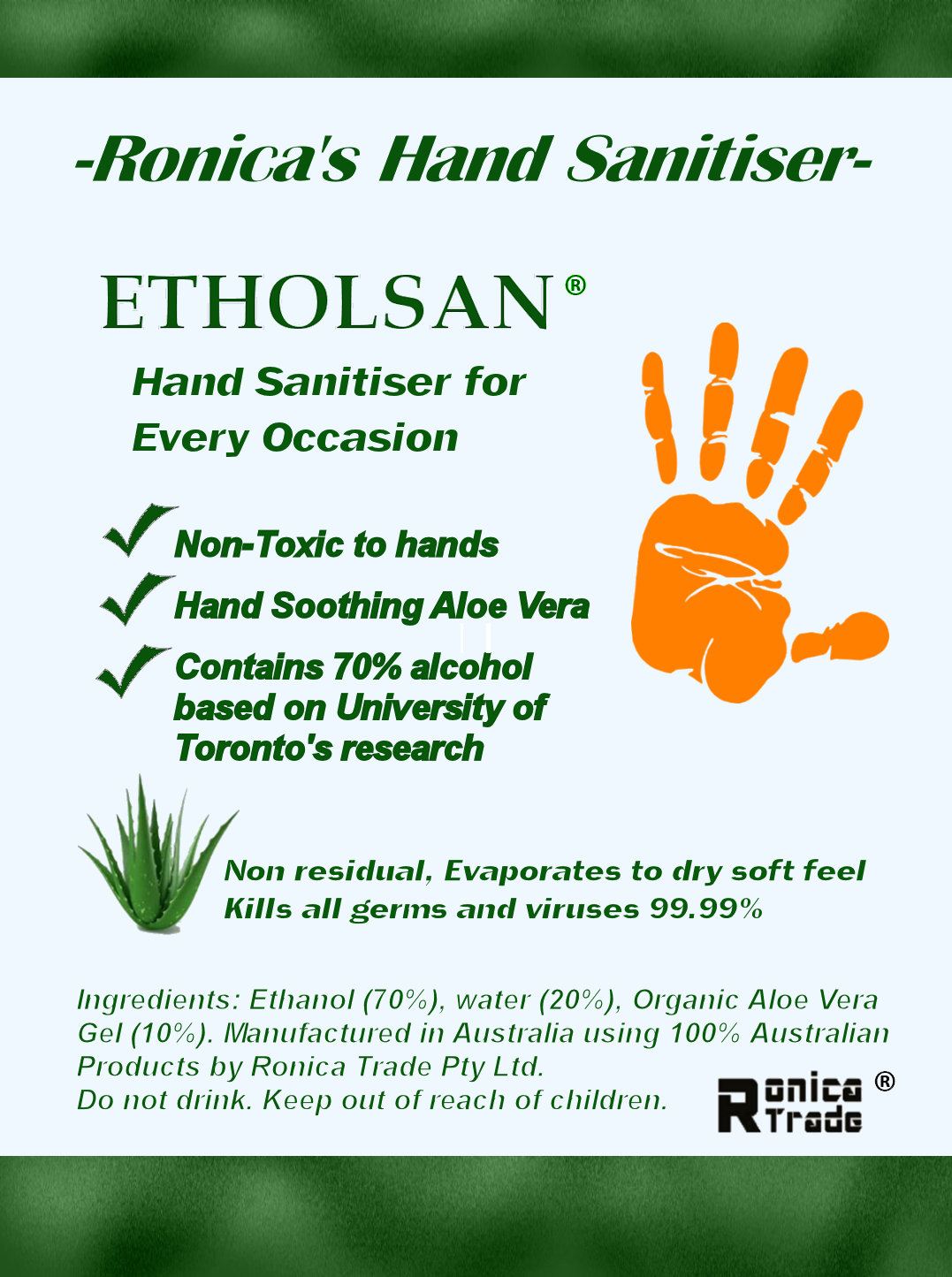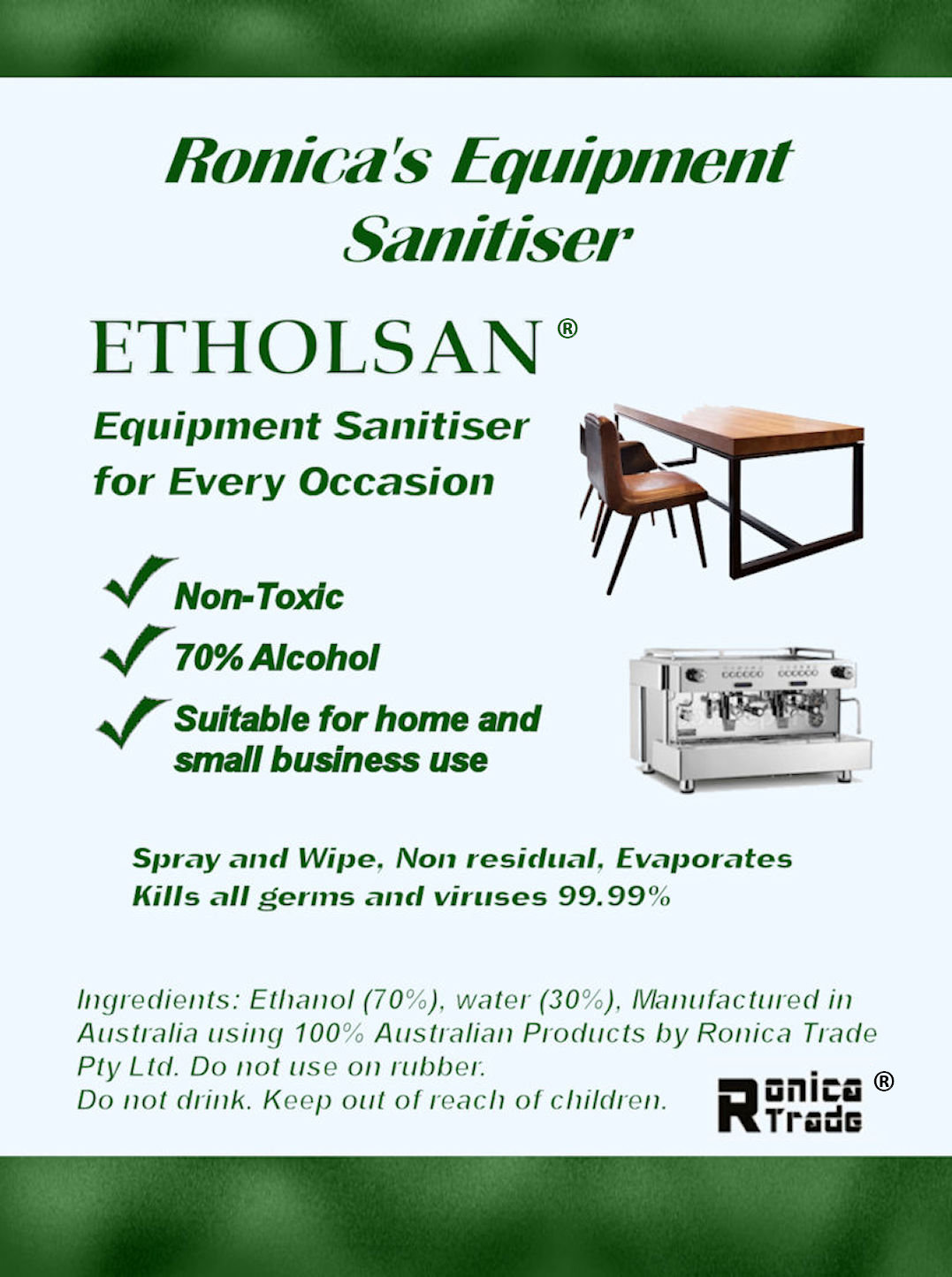|
An extract from Wikipedia states "Alcohol (Ethanol as in ETHOLSAN) has been used as an antiseptic at least as
early as 1363 with evidence to support its use becoming available in the late 1800s. Alcohol-based hand sanitiser has been commonly used in
Europe since at least the 1980s. The alcohol-based version is on the World Health Organization's List of Essential Medicines, the safest and
most effective medicines needed in a health system."
Alcohol-based hand sanitisers are effective at killing many types of bacteria and many viruses, including influenza,
rhinovirus, heppatitis, HIV, and coronavirus.
Good hand hygiene is a critical part of Australia’s response to any pandemic response. While washing hands with soap
is considered to be an effective way to practice good hand hygiene, hand sanitisers also play an important role in attempting to reduce
the spread of microorganisms. This is the case when water and soap is not at hand.
Ethanol (Ethyl alcohol) is one of the preferred agents to use, for its killing power of microorganisms and also its
low level of absorption and thus low toxicity via the skin.
However, alcohol as a hand sanitiser, is a drying agent, and will lead to drying and chapping of the hands, if used excessively.
Other alcohols are able to be used, such as isopropyl alcohol, also know as rubbing alcohol. It is cheap and effective
but some studies show it maybe more toxic in use on skin than ethanol. It is also very drying on the skin. It is however less volatile and
thus lasts longer on the skin.
Methanol is not advisable to be used as a skin sanitiser due to its low anti microbial activity and toxicity
at certain concentrations.
The alcohol content in the formulation of ETHOLSAN is effective in the denaturing of the protein lining of the germ cell,
also called microbes, bugs, microorganisms, that is the bacteria or virus cell wall, thereby rendering the organisms dead or ineffective in its
infectious ability. This was found in scientific studies conducted by the University of Toronto.
It is also generally accepted that at least 60% alcohol is required to be an effective sanitising solution.
The drying out of the skin is effectively overcome by applying moisturising emollients or salves which are absorbed
into the skin leaving it feeling soft and supple. There are a number of chemical products capable of moisturising skin, one of the cheapest being glycerol.
Possibly the best moisturiser, a very effective skin softener, having a pleasant smell, and no toxicity, is Organic Aloe Vera.
It is also probably the most expensive moisturiser, but the cost is worth the outcome as the skin of the hands are left feeling velvety, very soft,
refreshed and moist, and smelling lovely, no matter how much sanitiser is used or how often.
The use of Aloe Vera as the moisturising agent makes this product very soothing and leaves the skin feeling velvety soft,
fresh and with a lovely aroma, and thus is a superior product and value for money.
Ref: FDA, NCBI, NIH, CDC, Harvard, Science Journals, Papers. |
The alcohol content is effective in the denaturing of the protein lining of the germ cell, also called microbes, bugs,
microorganisms, that is the bacteria or virus cell wall, thereby rendering the organisms dead or ineffective in its infectious ability.
This was found in scientific studies conducted by the University of Toronto.
A higher level of alcohol was shown to be not more effective in the killing or destroying power of bacterial or virus germs.
In fact to make the alcohol effective in its action of damaging the protein lining of the cell and thus killing the organism, water is required and thus
a higher alcohol content with little or no water is found to be less effective.
It is also generally accepted that at least 60% alcohol is required to be an effective sanitising solution.
A 20% level of water was found to be sufficient to work with alcohol to render the cell membrane able to be damaged and
thus kill the bacteria or virus.
The water appears to allow the alcohol to bond with the proteins of the cell wall by the combined electrical and molecular attractions.
Studies have shown that as much as 99.99% of bacteria and/or virus cells, commonly called germs, are able to be killed
by such a sanitising solution.
Please note, alcohols are not effective against the killing of spores or fungi.
ETHOLSAN Ronica's Equipment Sanitiser is an ethanol (ethyl alcohol C2H5OH) based liquid sanitiser (disinfectant) that maybe sprayed
or otherwise placed on a surface where it is capable of destroying up to 99.99% of microorganisms, that is bacteria and / or viruses will be killed.
When used properly, this sanitiser can reduce surface contamination by bacteria and viruses to a safe level.
Please read all instructions.
Methanol is not advisable to be used as a surface sanitiser due to its low anti microbial activity and toxicity
at certain concentrations. In fact if used in the spraying on of surfaces, the level of methanol in the air will exceed the allowed level
of toxicity for human breathing.
Ensure adequate ventilation if used in doors in surface sanitising situations. Sufficient inhalation of ethanol
fumes may cause intoxication and impair cognitive and limbic functions.
Cognitive functions are mental processes that allow us to carry out any task. The limbic system is involved in
motivation, emotion, learning, and memory.
CAUTIONS :
Alcohols are volatile and flammable liquids, keep away from flames.
Alcohols can cause severe irritation to the eyes. Keep away from eyes. Do not drink. Do not use on broken or damaged skin.
Ensure adequate ventilation if used in doors in surface sanitising situations. Sufficient inhalation of ethanol
fumes may cause intoxication and impair cognitive and limbic functions. |






